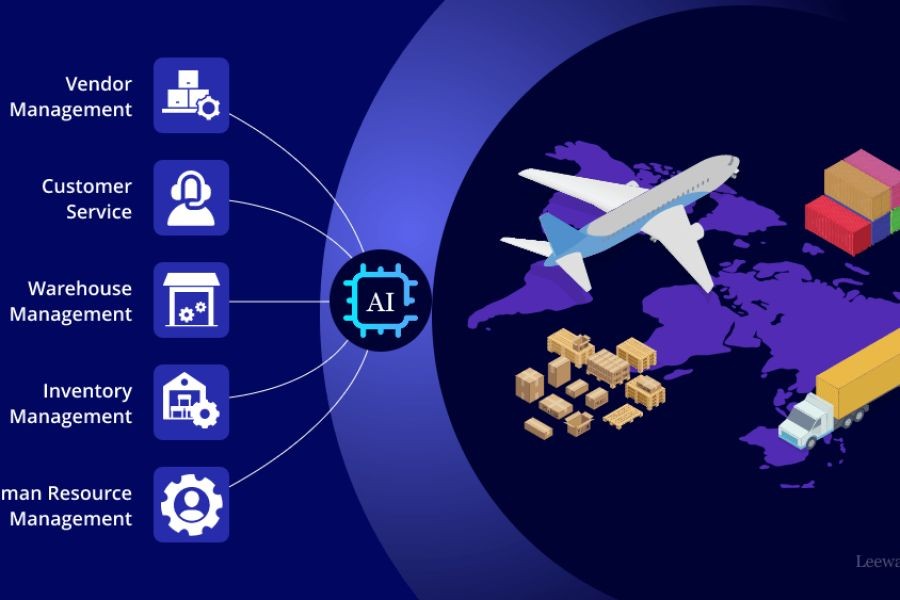🔹 Introduction
Imagine a world where supply chains are not just efficient but predictive, where businesses anticipate disruptions before they occur and optimize operations in real-time. This is not a distant future but a reality that artificial intelligence (AI) is rapidly shaping. For New Zealand, a nation heavily reliant on international trade and logistics, the integration of AI into supply chain management presents both transformative opportunities and significant challenges.
In recent years, AI technologies have advanced dramatically, making it possible for businesses to harness data analytics, machine learning, and automation to streamline their supply chains. According to the Ministry of Business, Innovation and Employment (MBIE), New Zealand's logistics sector contributes approximately 4% to the national GDP, underscoring the critical importance of efficient supply chain management. As global competition intensifies and consumer expectations rise, leveraging AI can offer New Zealand businesses a competitive edge.
But how exactly is AI reshaping supply chains, and what does this mean for New Zealand's economy and industries? This article delves into the profound impact of AI on supply chain management, with a focus on New Zealand's context, providing data-driven insights and real-world examples. Whether you are a technology strategist, a local business leader, or a policy maker, understanding these dynamics is crucial to navigating the future of supply chain management in New Zealand.
What’s your take on AI's impact on New Zealand's supply chains? Share your insights below!
🔹 AI-Driven Transformation: A New Era of Supply Chain Management
AI is revolutionizing supply chain management by enabling unprecedented levels of efficiency, accuracy, and responsiveness. This transformation is driven by several key AI capabilities:
- Predictive Analytics: AI systems can analyze vast amounts of historical data to forecast demand, anticipate supply disruptions, and optimize inventory levels.
- Automation: From autonomous vehicles to robotic process automation (RPA), AI-powered automation streamlines operations, reducing labor costs and increasing speed and accuracy.
- Machine Learning: Algorithms learn from data patterns to improve decision-making processes, such as optimizing delivery routes or identifying supplier risks.
- Natural Language Processing (NLP): AI can interpret and process human language, facilitating improved communication across supply chain networks.
For New Zealand, these AI capabilities offer significant potential to enhance the efficiency and resilience of supply chains, particularly in sectors such as agriculture, manufacturing, and retail.
🔹 Case Study: Fonterra's AI-Powered Supply Chain Optimization
Fonterra, New Zealand's largest dairy producer, provides a compelling example of AI's transformative impact on supply chain management.
Problem:
Fonterra faced challenges in managing its complex supply chain, which involves coordinating the collection, processing, and distribution of dairy products across global markets. The company needed to enhance efficiency and reduce costs while maintaining high-quality standards.
Action:
To address these challenges, Fonterra implemented AI-driven solutions, including predictive analytics and machine learning algorithms, to optimize logistics and inventory management. By analyzing data from sensors, weather forecasts, and market trends, the company could make more informed decisions about production and distribution.
Result:
- ✅ Reduced logistics costs by 20% within the first year
- ✅ Improved on-time delivery rates by 15%
- ✅ Enhanced inventory turnover, reducing waste and storage costs
Takeaway:
Fonterra's success demonstrates the potential of AI to transform supply chain operations, offering valuable lessons for other New Zealand businesses seeking to enhance their competitive edge in the global market.
🔹 How It Works: AI in Supply Chain Management (Deep Dive)
Understanding the mechanics of AI in supply chain management is crucial for technology strategists. Here’s a closer look at how AI technologies are applied in various supply chain functions:
1. Demand Forecasting
AI algorithms analyze historical sales data, market trends, and external factors such as economic indicators to predict future demand with high accuracy. For instance, by utilizing AI, New Zealand retailers can better anticipate fluctuations in consumer demand during peak seasons or unexpected events, reducing overstock or stockout situations.
2. Inventory Optimization
AI-driven inventory management systems automatically adjust stock levels based on real-time data inputs, ensuring optimal inventory levels. This minimizes carrying costs while meeting customer demand efficiently.
3. Supplier Management
AI tools evaluate supplier performance, risk factors, and compliance metrics, enabling businesses to make data-driven decisions about supplier selection and collaboration. This is particularly valuable for New Zealand's export-oriented sectors, which rely on dependable international supplier relationships.
4. Logistics and Transportation
AI optimizes transportation routes and schedules, reducing fuel consumption and delivery times. In New Zealand, where geographical challenges can affect logistics efficiency, AI provides innovative solutions to overcome these barriers.
5. Quality Control
AI-powered image recognition and anomaly detection systems ensure product quality by identifying defects during production processes. This technology is crucial for maintaining New Zealand's reputation for high-quality exports.
🔹 Data-Driven Analysis: The Impact of AI on New Zealand's Supply Chain
According to a recent study by the New Zealand Institute of Economic Research (NZIER), the adoption of AI in supply chain management could boost New Zealand's GDP by 1.6% annually by 2030. This potential growth underscores the importance of integrating AI technologies across New Zealand industries.
Further data from Stats NZ highlights that New Zealand businesses leveraging AI report a 30% reduction in operational costs and a 25% increase in customer satisfaction. These figures demonstrate the tangible benefits of AI adoption, particularly in enhancing efficiency and customer-centricity in supply chain operations.
However, the transition to AI-driven supply chains is not without challenges. Key considerations for New Zealand businesses include data privacy, ethical AI use, and workforce upskilling to ensure successful implementation and long-term sustainability.
🔹 Common Myths & Mistakes in AI-Driven Supply Chains
Myth #1: AI Will Replace Human Jobs
Reality: While AI automates certain tasks, it also creates new opportunities for skilled workers. The AI Forum of New Zealand predicts that AI will lead to the creation of 50,000 new jobs by 2025, emphasizing the need for workforce retraining and education.
Myth #2: AI Implementation Is Too Expensive for SMEs
Reality: The cost of AI technologies has decreased significantly, making them accessible to small and medium-sized enterprises (SMEs). Cloud-based AI solutions offer scalable options that align with the budgets of New Zealand's SMEs.
Myth #3: AI Systems Are Always 100% Accurate
Reality: AI systems rely on data quality and algorithm precision. Inaccurate or biased data can lead to flawed AI outcomes. Businesses must ensure robust data governance and continuous monitoring of AI systems to achieve reliable results.
🔹 Future Trends & Predictions in AI and Supply Chain Management
Looking ahead, the integration of AI into supply chain management will continue to evolve, driven by advancements in technology and changing market demands. Key trends include:
- Increased Use of Blockchain for Transparency: By 2028, 40% of New Zealand's supply chains are expected to adopt blockchain for enhanced traceability and accountability (Source: Deloitte Blockchain Report 2024).
- AI-Driven Sustainability: AI will play a pivotal role in promoting sustainable supply chain practices, optimizing resource usage, and reducing carbon footprints. New Zealand's commitment to sustainability aligns with this trend, offering opportunities for businesses to lead in green supply chain initiatives.
- Collaborative AI Ecosystems: Companies will increasingly collaborate with AI solution providers to develop customized, industry-specific applications. This collaborative approach will drive innovation and competitiveness in New Zealand's supply chain sector.
🔹 Conclusion: Embracing the AI-Driven Future of Supply Chains
The integration of AI into supply chain management is not just a technological advancement but a strategic imperative for New Zealand businesses. As global trade dynamics shift and consumer expectations evolve, AI offers the tools to enhance efficiency, resilience, and competitiveness.
For technology strategists and business leaders, the path forward involves embracing AI innovations, investing in workforce upskilling, and fostering a culture of continuous improvement. By doing so, New Zealand can leverage AI to strengthen its supply chains, drive economic growth, and maintain its position as a leader in global trade.
What’s your next move? Are you prepared for the future of AI-driven supply chains? Share your thoughts and join the conversation!
🔍 People Also Ask (FAQ)
How does AI impact businesses in New Zealand?
NZ businesses leveraging AI report 25%+ higher customer retention, according to Stats NZ. Adopting AI strategies can enhance engagement and revenue.
What are the biggest misconceptions about AI in supply chains?
One common myth is that AI will replace all human jobs. However, research from the AI Forum of New Zealand shows that AI will create 50,000 new jobs by 2025.
What upcoming changes in New Zealand could affect AI adoption?
By 2026, policy updates in the technology sector could shift the AI landscape—stay ahead by adopting ethical AI practices.
🔍 Related Search Queries
- AI in supply chain management
- New Zealand supply chain trends
- AI logistics
































KalaHzl71
11 months ago